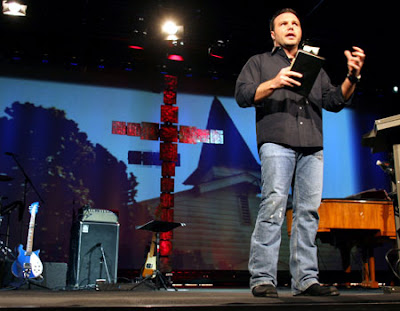
Sunday, May 31, 2009
even there...

Saturday, May 30, 2009
Friday, May 29, 2009
Thursday, May 28, 2009
hope rise.

Wednesday, May 27, 2009
new life in the same country...
 Has Christian America Come to an End?
Has Christian America Come to an End?By Mark Driscoll
Pastor, Mars Hill Church
Has Christian America come to an end? That question has been hotly debated since Newsweek published their recent feature story reporting that the number of Americans claiming no religious affiliation has nearly doubled since 1990. Additionally, the percentage of self-identified Christians has dropped ten points in the past two decades. As an evangelical pastor with one of America’s fastest-growing churches in one of its least churched cities, I do not find the report surprising or discouraging. Newsweek missed the subtle — but vital — difference between Christian America and Christendom America.
Christian America is comprised of those people who have had a truly transforming experience with Jesus Christ and are living new lives as practicing Christians. Experts such as sociologist Bradford Wilcox at the University of Virginia have well documented the fact that those who practice Christian faith by reading their Bibles regularly, attending church, praying, and so forth are far less likely to engage in acts such as adultery, divorce, substance abuse, and the like.
Therefore, the number of Christians has likely not diminished as much as has been reported, but rather we are seeing an increasingly accurate accounting of actual Christian America. The ARIS study confirmed this by saying that the number of people who claimed to be Christians decreased, while the number of people who claimed to be evangelical increased. This fact is not discouraging, but rather clarifying.
Additionally, Christianity has always reformed itself around major technological innovations. Just as the printing press enabled the Protestant Reformation, so too the Internet and video technology are changing how ministry is done. Networks are currently overtaking denominations as the gathering place for innovative young leaders, megachurches are using video to become multi-site, and young pastors are increasingly moving into cities to plant churches. Our own church planting network Acts 29, for example, now has 250 church plants and is on pace to be at one thousand churches in roughly seven years. We are not alone. As the churches and ministry forms of Christendom are dying, new churches, networks, and ministry forms are replacing them with great passion, as the ARIS study confirms. Therefore, while it is too early to tell, we may in fact simply be living in the time between the times of Christendom and post-Christendom America, with Christian America getting more innovative and devoted than ever and poised to see many more lives changed by Jesus Christ.
There is one thing that is concerning, namely the loss of the residue of some aspects of Protestant morality. For example, as authority is less and less respected, and social order becomes more difficult to maintain, and sexual sin increases the number of addicts and abuse victims (as we are dealing with by the thousands in our church), the result will be a culture that is less beneficial for Christians and non-Christians alike. This is because, although being good does not save you, insofar as the culture is concerned, it is still good. Proceeding forward, the distinctions in lifestyle between Christian America and non-Christian America will become increasingly stark and will require great service by the church in the areas of mercy and justice to help people damaged by a Christless culture.
Tuesday, May 26, 2009
todays top ten.

Monday, May 25, 2009
Thursday, May 21, 2009
Wednesday, May 20, 2009
Monday, May 18, 2009
one angle on the slowdown
By KAYLA WEBLEY / HONG KONG Tuesday, Apr. 28, 2009
Becky Freer says adopting a 10-month-old girl from China was the best thing she ever did. So when Freer, 44, recently decided to further expand her Austin, Texas – based family by adopting another daughter, she thought China was the obvious choice. She soon discovered however, that as a single woman, she is no longer eligible. "Three years ago I was an acceptable parent, and now I'm not," she says. "It seems unfair." While Freer has since been approved to adopt a daughter from Ethiopia, she is one of a growing number of prospective parents who are unable to adopt from China under new laws Beijing put in place in May 2007.
International adoptions in the U.S. gained momentum during the 1990s as families reached out to orphans in poorer corners of the world. China's international adoption program, which opened in 1992, has become particularly popular due to its transparency and efficiency. But the stricter guidelines, intended to limit an overwhelming number of applicants, are proving effective. Adoptions of Chinese children by U.S. citizens have dropped 50% in three years, from 7,906 children in 2005 to 3,909 in 2008, according to the U.S. State Department. Among the new regulations, adoptive parents are required to meet certain educational and financial requirements, and must be married, be under 50, not be clinically obese, not have taken antidepressant medication in the past two years and not have any facial deformities. (See pictures of American children up for adoption.)
Even before the new regulations, adopting a child from China was never simple. The state-run China Center for Adoption Affairs requires U.S. applicants to submit a long list of documents, including home studies completed by social workers and federal background checks. Fees and expenses can amount to upward of $20,000, and the wait can be long. China has a backlog of approved international applicants and is only now placing children into the homes of families who were approved for adoption more than three years ago. Some families that don't want to wait that long look to China's "waiting child" list of children with special needs — a national database where prospective parents can read about orphans with disabilities. (Read "Cleaning Up International Adoptions.")
The new laws are only part of the reason why fewer Chinese children are being adopted by American families. While the Chinese government does not release domestic-adoption figures, U.S.-based adoption agencies say more Chinese children are being adopted in the mainland. (Adopting a second child is one of the few exceptions to China's one-child policy.) "More and more people can not only afford to adopt a child, but culturally it's also more accepted," says Cory Barron, director of the St. Louis, Missouri – based adoption agency Children's Hope International.
A change in gender perception may also be a factor. While girls still make up 95% of children at orphanages, Josh Zhong, director of Chinese Children Adoption International in Centennial, Colorado, says that, too, has shifted. "People's attitude toward having girls is changing dramatically," Zhong says. "I have friends [in China] who have girls, and they are just so excited." It's part of a shift that, for the visible future, is keeping more of China's children closer to home.
Saturday, May 16, 2009
we [all] do.
 We are great at celebrating whatever is important to us. We champion whatever we are most passionate about. Some call it worship. Others do not. Either way, it is undeniable. People are worshipers. Just try a random search of "fans" on youtube. Most people, if not all, have something or someone to be all about.
We are great at celebrating whatever is important to us. We champion whatever we are most passionate about. Some call it worship. Others do not. Either way, it is undeniable. People are worshipers. Just try a random search of "fans" on youtube. Most people, if not all, have something or someone to be all about.This has been on my radar all week, having heard a great message on how we were made to worship at Passion City Church, and being asked to speak on the very same idea at our church tomorrow. So, much of my thoughts and interaction with the Lord and with people has been on this simple idea: responding more to who God is and what He has done.
We are free to do all of the above -- So, love _______ , enjoy ______ , talk about _______ , but consider that our freedom means that we love God the most, and that we love everything and everyone less; for our own joy and His ever-deserving glory.
Friday, May 15, 2009
tell me this -

Thursday, May 14, 2009
Culture Making

"It is not enough to condemn culture. Nor is it sufficient merely to critique culture or to copy culture. Most of the time, we just consume culture. But the only way to change culture is to create culture.
Andy Crouch unleashes a stirring manifesto calling Christians to be culture makers. For too long, Christians have had an insufficient view of culture and have waged misguided “culture wars.” But we must reclaim the cultural mandate to be the creative cultivators that God designed us to be. Culture is what we make of the world, both in creating cultural artifacts as well as in making sense of the world around us. By making chairs and omelets, languages and laws, we participate in the good work of culture making.
Crouch unpacks the complexities of how culture works and gives us tools for cultivating and creating culture. He navigates the dynamics of cultural change and probes the role and efficacy of our various cultural gestures and postures. Keen biblical exposition demonstrates that creating culture is central to the whole scriptural narrative, the ministry of Jesus and the call to the church. He guards against naive assumptions about “changing the world,” but points us to hopeful examples from church history and contemporary society of how culture is made and shaped. Ultimately, our culture making is done in partnership with God’s own making and transforming of culture. Read more here"
I'm reading this book over the next two weeks. So far, it has been very interesting. One of the most practical things I have been thinking about so far, is a statement in the book discussing the role of culture making within the family. In so many words, Crouch conveys that for better and worse, the family is a culture making epicenter. In thinking about our lives, and the fact we will be raising "3rd" culture children in a multi-cultural urban setting -- I am challenged to evaluate what are the non-negotiable cultural artifacts for our family. I'm sure I'll have more thoughts later.
Monday, May 11, 2009
ever played washers?
 Think horseshoes, only no horseshoes. Sounds ridiculous, yet who knew such creative revelry could unite friends and family? At first, I thought I had been duped into a made-up-game, and then I read this.
Think horseshoes, only no horseshoes. Sounds ridiculous, yet who knew such creative revelry could unite friends and family? At first, I thought I had been duped into a made-up-game, and then I read this.
Sunday, May 10, 2009
passion city church

Saturday, May 09, 2009
Thursday, May 07, 2009
Wednesday, May 06, 2009
Tuesday, May 05, 2009
vintage jesus

Monday, May 04, 2009
(A)live
Sunday, May 03, 2009
Saturday, May 02, 2009
yet another step










